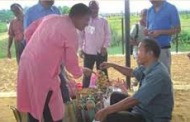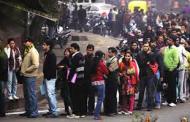New Delhi, Jun 3 (PTI) Agriculture Minister Radha Mohan Singh today exuded confidence over tackling deficient monsoon, minimising production losses and its possible impact on overall economy.
He also said that the government is working on bringing a new crop insurance policy by end of this year to protect farmers’ income.
To check price rise in pulses, the Minister said that the government is mulling over improving domestic supplies through imports and is collecting pulses requirement data from states.
Addressing a press conference organised to highlight the Agriculture Ministry’s one year achievement, Singh said: “In agriculture sector, there would obviously be some losses if there are problems (of deficient rains). We have confidence and policies in place to ensure there is minimum damage to agriculture sector and overall economy.”
At present, the government is ready with contingency plans for 580 districts and is in touch with state governments and agriculture research bodies to tackle the situation, he added.
Stating that Indian agriculture is resilient to rainfall deficit, Singh said, “When we came to power, we faced drought-like situation. Everyone were tensed. But our ministry worked hard to minimise the damage. There were losses in production but the losses were not that huge. This time, we will face the situation based on our earlier experience.”
Asked if bad days are ahead for farmers, the Minister said, “Good and bad days are creation of man-made or nature.
Man-made bad days have ended and good days have begun…”
The government cannot stop natural calamity but it has the responsibility to face any eventualities, he said adding that efforts would be made to reduce the impact of deficit rains on agriculture output.
The Met department has predicted “deficient” monsoon and revised its forecast from 93 per cent to 88 per cent for this year, with north-west region of the country expected to be hit the most.
Last year, the country had received 12 per cent less rains, which hit production of grains, cotton and oilseeds.
According to the government’s estimate, total foodgrains production has declined to 251.12 million tonnes in the 2014-15 crop year (July-June) from a record production of 265.04 million tonnes in the previous year.
Due to poor monsoon, agriculture growth stood at 0.2 per cent in the 2014-15 fiscal. .
New Delhi, Jun 3 (PTI) A Delhi court has acquitted a man of the charges of raping his divorced wife and compelling her to terminate pregnancy thrice saying she lodged a false case against him after he stopped paying money to her.
Additional Sessions Judge Virender Bhatt absolved the man, a Delhi resident, saying, “It appears that accused was paying money to her even after the dissolution of their marriage in year 2007 and later when he stopped paying money to her, she consulted a lawyer, on whose advice she lodged a false complaint of rape and forced abortions.”
The judge, while acquitting the accused of the charges under sections 376 (rape), 313 (causing miscarriage without woman’s consent) and 506 (criminal intimidation) of the IPC, observed that there was no consistency in statements of the woman and she has been changing her version at every stage.
The court noted that the complainant, in her statement recorded before a metropolitan magistrate, had stated that her grievance against the accused was that he had stopped paying money to her and also used to avoid her telephone calls.
She then consulted her lawyer telling him that she does not have any money to make her both ends meet and upon the advice of the lawyer, she filed a complaint of rape, it said.
The court also took into consideration the petition under domestic violence act filed by the woman in 2014, which she withdrew later saying that she was living separately with her children from first marriage and did not have any physical relations with the accused since divorce.
Regarding the claim that she was forced to abort her pregnancy three times, the court said there was no evidence regarding two out of the three pregnancies.
“There is no evidence on record regarding the abortion of prosecutrix of the years 2005 and 2008. Prosecution produced evidence only regarding her abortion in 2013 but documents demonstrate that she had herself visited hospital in 2013 for termination of her pregnancy with her consent,” it said.
Jaipur, Jun 3 (PTI) Jaipur Metro, touted as one of the fastest built metro systems in the country, was thrown open to public today.
Chief Minister Vasundhara Raje flagged off the inaugural train on 9.6 km long route from Mansarovar to Chandpole.
Raje along with ministers, officers and supporters travelled in the train from Mansarovar to Chandpole and alighted at Civil Lines station while returning.
After the opening ceremony, the Jaipur Metro commenced its regular commercial operations from all its 9 stations– Mansarovar, New Aatish Market, Vivek Vihar, Shyam Nagar, Ram Nagar, Civil Lines, Railway Station, Sindhi Camp and Chandpole.
“After this, we will try to connect the next part of the project with it,” Raje told reporters at the Civil Lines station.
She visited Mansarovar station where Jaipur Metro CMD N C Goel briefed her about the functioning and operations.
People in buildings along the metro line were seen greeting and waving hands as the train undertook its first official journey.
Large number of locals were seen queuing up at the ticket counters to enjoy their first ride in the Jaipur metro.
As per the time table issued by the JMRC for first three months, trains will operate from Mansarovar to Chandpole and from Chandpole to Mansarovar at a frequency of 10 to 15 minutes from 6.45 AM to 9 PM every day.
The fare structure varies for peak and off-peak hours.
They have been fixed in multiples of Rs 5 and a flat discount of Rs 5 has been offered for off-peak hours.
For the first six months, off-peak fares will be charged throughout the day. Automatic fare collection system has been installed to collect and manage the fare revenue.
To encourage people to travel in the metro, upto 15 per cent discount has been offered on smart cards, which can be recharged using Jaipur Metro website or Ticket Vending Machines installed at all stations.
Two types of tourist cards, one-day tour card and three- day tour card, have been introduced, which can be used for unlimited number of trips during the day(s) of their validity, the JMRC said.
For effective execution of the project in its initial stages, the total work of Phase-1 was divided into two parts- Phase-1A and Phase-1B.
The phase 1A is from Mansarovar to Chandpole, opened today, while work on phase 1B from Chandpole to Badi Chaupad is underway. .
Mumbai, June 3 (PTI) Witnessing heavy selling pressure in almost all the sectors, the benchmark BSE Sensex dipped below 27,000-mark to hit its lowest levels in almost 2-1/2 weeks, on fears of a drought in the country this year.
Meanwhile, India’s services sector activity contracted for the first time in 13 months in May, largely due to decline in new order flows amid competitive pressure and natural disasters, an HSBC survey said today.
The 30-share Sensex resumed higher at 27,230.68 and hovered in a range of 27,276.22 to 26,975.79 before quoting 26,984.65 at 1115 hrs, showing a sharp fall of 203.73 points or 0.75 per cent.
The NSE Nifty was also quoted lower by 67.05 points or 0.81 per cent at 8,169.40 at 1115 hrs.
Major losers were Tata Motors at 4.22 per cent, ITC 3.48 per cent, Axis bank 1.94 per cent, ICICI Bank 1.82 per cent, HUL 1.80 per cent, SunPharma 1.74 per cent, Tata Power 1.73 per cent, Vedanta 1.64 per cent, Maruti 1.21, Bajaj Auto 1.06 and Hindalco 1.05 per cent.
Meanwhile, Foreign portfolio investors sold shares worth Rs 594.14 crore yesterday, while domestic institutional investors bought shares worth Rs 271.64 crore yesterday, as per provisional data.
Globally, Asian shares were trading mixed. Key indices in China, Hong Kong, Singapore and South Korea were up by 0.16 per cent to 0.61 per cent. Indices in Taiwan, Japan and Indonesia were down by 0.17 per cent to 1.55 per cent.
In New York, the US stocks ticked lower overnight as a jump in bond yields weighed on utilities, but optimism that Greece may be close to a deal with its creditors limited losses.
New Delhi, Jun 3 (PTI) Ahead of Prime Minister Narendra Modi’s visit to Bangladesh, Meghalaya Chief Minister Mukul Sangma today strongly pitched for setting up more border ‘haats’ or markets along the Indo-Bangla border to encourage trade and commerce between the two countries.
Sangma also hoped that the Prime Minister would discuss with his Bangladesh counterpart Sheikh Hasina the possibility of jointly developing road networks so that the land-locked Northeastern states could use Bangladesh’s Chittagong port for exports.
“The Meghalaya government has plans to set up 22 border haats along the Indo-Bangladesh border to encourage trade and commerce and people-to-people contact. Currently, we have just two border haats. The Union Commerce Ministry must take initiatives to set up more border haats along the international border,” Meghalaya Chief Minister Mukul Sangma told PTI here.
Prime Minister Modi and Bangladesh premier Sheikh Hasina will jointly inaugurate a border haat at Kamalasagar in Tripura’s Sipahijala district, which borders Brahmanbaria district of Bangladesh, this weekend.
The ‘haat’ would be jointly inaugurated through video conferencing from Dhaka during Modi’s two-day visit to Bangladesh beginning June 6.
Two border haats were set up in 2012 on the Meghalaya sector of Indo-Bangladesh border — at Kalaichar (India)-Baliamari (Bangladesh) and at Balat (India)-Dalora (Bangladesh).
Around 15-16 local agricultural and horticultural products, spices, minor forest produce (excluding timber), fresh and dry fish, dairy and poultry products, cottage industry items, wooden furniture, handloom and handicraft items are allowed to sell in the border haats, where people of both the countries can participate in trading on designated days and time every week.
Sangma advocated jointly developing road networks of India and Bangladesh so that the Chittagong port in the neighbouring country could be used by the Northeastern states for export of various products.
“I hope that the Prime Minister will take up the issue with his Bangladesh counterpart,” he said.
India and Bangladesh share a 4,096-km border along West Bengal (2,216 km), Tripura (856 km), Assam (263 km), Meghalaya (443 km) and Mizoram (318 km). The two neighbours have 2,979 km of land border and 1,117 km of riverine boundaries.
New Delhi, Jun 3 (PTI) Private schools in the city have been warned of strict action by the Education Directorate if they bar parents from carrying mobile phones in school premises due to fears that they could be used to collect evidence against demands for capitation fees.
The directive has come following complaints that parents have been stopped from carrying mobile phones by the school managements fearing it could be used to collect audio-video evidence against demand of capitation fee.
“Collection of capitation fee by a school while admitting a child in a school is illegal and punishable as per the Right to Education (RTE) Act, 2009,” according to a circular issued by P Lata Tara, Deputy Director Education (ACT I).
The Directorate in its order dated February 23 had directed managements of all private unaided recognised schools not to charge any capitation fee at the time of admission.
Delhi Government had also advised general public to collect evidence against demands of capitation fee by schools through audio-video recordings in such cases.
“lt has come to the notice of the department that managements of some private unaided recognised schools are not allowing parents visiting schools for admissions to enter premises with their mobiles and that their mobile phones are retained at the entry gate of the school which causes hindrance for parents to collect evidence of such malpractices,” said the official.
“All the school managements of private unaided recognised schools have been directed that, parents/guardians must be allowed to carry their mobile phones within school premises failing which strict action will be taken against the defaulter schools,” she said.
The RTE Act defines capitation fee as ‘any kind of donation or contribution or payment other than the fee notified by the school.’ Section 13(1) of the Act prohibits taking of capitation fee by the schools.
Chennai, Jun 3 (PTI) After taking up the cause of farmers in Punjab and Telangana, Congress Vice-President Rahul Gandhi will visit Tamil Nadu for a similar campaign, the party’s state unit said today.
A resolution to this effect was passed at the TNCC Executive here, which met under AICC General Secretary Mukul Wasnik and state chief E V K S Elangovan.
“Rahul Gandhi has accepted to tour the state and meet farmers following a plea made by the TNCC. Congress workers should make all efforts to make it a success,” it said but did not mention when the Congress leader would visit Tamil Nadu.
“The Centre and State government are hand-in-glove in taking steps inimical to farmers’ interests. The AIADMK government by supporting the Land Bill has earned the wrath of farmers,” it alleged.
Among others, the party slammed the ‘anti-people’ approach of the BJP-led NDA government at the Centre and vowed to strive for a regime change in Tamil Nadu next year by galvanising people’s support against the “corrupt AIADMK government.”
Assembly polls in the state are due next year.
The party also condemned the “oppression by communal forces,” in IIT, Madras, where a study circle was derecognised for violation of code of conduct for allegedly criticising Prime Minister Narendra Modi.
Thiruvananthapuram, Jun 3 (PTI) Defying the Centre’s uniform fishing ban, traditional fishermen affiliated to a state fishermen’s body today put out to sea off Chetuva coastal hamlet in Thrissur district and ventured upto 15 nautical miles for their catch.
Nearly 60 fishermen in six traditional craft set out to sea in protest against the Centre’s decision to impose 61-day fishing ban from June 1 to July 31.
“We went upto 15 nautical miles for fishing operations.
This agitation to press for the rights of traditional fishermen was a success,” Kerala Pradesh Malsya Thozhilali Congress leader T N Prathapan, MLA, told PTI over phone from sea.
The stir was above caste, religion and politics, he said, adding it was an agitation by ‘neglected’ people.
Congress led UDF government in Kerala had opposed the Centre’s ban on fishing activities in the Exclusive Economic Zone for 61 days from June 1 to July 31 and had maintained it would be imposed only for 47-days from June 15 to July 31 as in earlier years.
Yesterday, Fisheries Minister K Babu had made it clear after a top level meeting that Kerala was not for a confrontation with the Centre over the issue and that the ban would be in force for 45 days in coastal areas from June 15.
Chief Minister Oommen Chandy had met Modi at the latter’s residence on May 29 and discussed issues concerning fishermen, two days after Congress Vice President Rahul Gandhi slammed the Centre’s decision to extend ban on trawling.
Fishermen in Kerala are protesting the NDA government’s decision to extend trawling ban from 45 to 61 days to protect marine health and certain provisions of the Meenakumari report on deep sea fishing in coastal areas.
Hyderabad, Jun 3 (PTI) The samples of Maggi instant noodles are being tested at a lab here as part of the nationwide exercise over the alleged presence of mono-sodium glutamate (MSG) and lead in their food products.
“We have taken 22 samples from our state. We have sent them for screening. Actual reporting time is two weeks maximum,” K Amarender Reddy, Director of Institute of Preventive Medicine (IPM), Telangana, told PTI here.
The samples were lifted on Monday last, he said.
The testing is being done as part of the nationwide drive on the directives from the Central food safety body, Reddy said.
“It is a directive, not from the state government.
Directive from the Central food safety… The directive has gone to all states to lift the samples. We look for those two items, mono-sodium glutamate and lead,” he said.
Andhra Pradesh shares the lab here with Telangana, IPM official for AP government Dr Manjari said.
Raipur, Jun 3 (PTI) A 32-year-old man allegedly killed his two minor daughters by throwing them into a well as he wanted a male child in Balod district of the state, police said today.
The accused Chandradev Kongera has been arrested for the murder of his daughters- Madhuri (9) and Puja (4)- near his native place Fadaradih village under Suregaon police station limits on Monday afternoon, Balod Superintendent of Police Sheikh Arif Hussain told PTI.
“Chandradev, a farmer, was returning along with his two daughters on a bicycle from his in-laws’ village Sareli to Fadaradih on June 1. On his way, he stopped by a field before his native place and pushed the girls into a well there,” Hussain said.
Thereafter, he returned to his village and narrated a false story to the villagers that some persons tried to kidnap his daughters and when he resisted them, they threw the minors into a well, the SP said.
However, the villagers suspected that something was amiss and informed the police.
“When police questioned him, Chandradev broke down and confessed to have killed his daughters,” the SP said.
Bodies of the girls were fished out of the well on Monday night.
During interrogation, the accused revealed that he wanted a son, but his wife refused to go for a third child after two daughters, which prompted him to commit the offence.
“He?wanted to convince his wife for the third?child after the death of their two daughters,” the SP said.
The accused has been booked under IPC section 302 (murder), he said, adding that further probe was on.
















Recent Comments